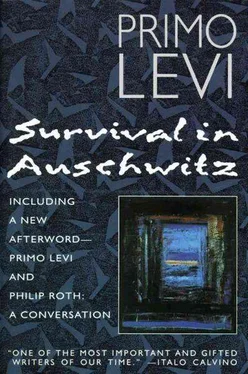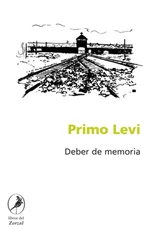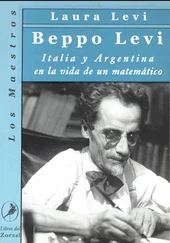And then finally Alberto came, defying the prohibition, to say good-bye to me from the window. We were inseparable: we were ‘the two Italians’ and foreigners even mistook our names. For six months we had shared a bunk and every scrap of food ‘organized’ in excess of the ration; but he had had scarlet fever as a child and I was unable to infect him. So he left and I remained. We said good-bye, not many words were needed, we had already discussed our affairs countless times. We did not think we would be separated for very long. He had found a sturdy pair of leather shoes in a reasonable condition: he was one of those fellows who immediately find everything they need.
He also was cheerful and confident, as were all those who were leaving. It was understandable: something great and new was about to happen; we could finally feel a force around us which was not of Germany; we could concretely feel the impending collapse of that hated world of ours. At any rate, the healthy ones who, despite all their tiredness and hunger, were still able to move, could feel this. But it is obvious that whoever is too weak, or naked or barefoot, thinks and feels in a different way, and what dominated our thoughts was the paralysing sensation of being totally helpless in the hands of fate.
All the healthy prisoners (except a few prudent ones who at the last moment undressed and hid themselves in the hospital beds) left during the night of 18 January 1945. They must have been about twenty thousand, coming from different camps. Almost in their entirety they vanished during the evacuation march: Alberto was among them. Perhaps someone will write their story one day.
So we remained in our bunks, alone with our illnesses, and with our inertia stronger than fear.
In the whole Ka-Be we numbered perhaps eight hundred. In our room there were eleven of us, each in his own bunk, except for Charles and Arthur who slept together. The rhythm of the great machine of the Lager was extinguished. For us began the ten days outside both world and time.
18 January. During the night of the evacuation the camp-kitchens continued to function, and on the following morning the last distribution of soup took place in the hospital. The central-heating plant had been abandoned; in the huts a little heat still lingered on, but hour by hour the temperature dropped and it was evident that we would soon suffer from the cold. Outside it must have been at least 5°F. below zero; most of the patients had only a shirt and some of them not even that.
Nobody knew what our fate would be. Some SS men had remained, some of the guard towers were still occupied.
About midday an SS officer made a tour, of the huts. He appointed a chief in each of them, selecting from among the remaining non-Jews, and ordered a list of the patients to be made at once, divided into Jews and non-Jews. The matter seemed clear. No one was surprised that the Germans preserved their national love of classification until the very end, nor did any Jew seriously expect to live until the following day.
The two Frenchmen had not understood and were frightened. I translated the speech of the SS man. I was annoyed that they should be afraid: they had not even experienced a month of the Lager, they hardly suffered from hunger yet, they were not even Jews, but they were afraid.
There was one more distribution of bread. I spent the afternoon reading the book left by the doctor: it was interesting and I can remember it with curious accuracy. I also made a visit to the neighbouring ward in search of blankets; many patients had been sent out from there and their blankets were free. I brought back some quite heavy ones.
When Arthur heard that they came from the dysentery ward, he looked disgusted: ‘Y avait point besoin de la dire’; in fact, they were polluted. But I thought that in any case, knowing what awaited us, we might as well sleep comfortably.
It was soon night hut the electric light remained on. We saw with tranquil fear that an armed SS man stood at the corner of the hut. I had no desire to talk and was not afraid except in that external and conditional manner I have described. I continued reading until late.
There were no clocks, but it must have been about 11 p.m. when all the lights went out, even those of the reflectors on the guard-towers. One could see the searchlight beams in the distance. A cluster of intense lights burst out in the sky, remaining immobile, crudely illuminating the earth. One could hear the roar of the aeroplanes.
Then the bombardment began. It was nothing new: I climbed down to the ground, put my bare feet into my shoes and waited.
It seemed far away, perhaps over Auschwitz.
But then there was a near explosion, and before one could think, a second and a third one, loud enough to burst one’s eardrums. Windows were breaking, the hut shook, the spoon I had fixed in the wall fell down.
Then it seemed all over. Cagnolati, a young peasant also from the Vosges, had apparently never experienced a raid. He had jumped out naked from his bed and was concealed in a corner, screaming. After a few minutes it was obvious that the camp had been struck. Two huts were burning fiercely, another two had been pulverized, but they were all empty. Dozens of patients arrived, naked and wretched, from a hut threatened by fire: they asked for shelter. It was impossible to take them in. They insisted, begging and threatening in many languages. We had to barricade the door. They dragged themselves elsewhere, lit up by the flames, barefoot in the melting snow. Many trailed behind them streaming bandages. There seemed no danger to our hut, so long as the wind did not change.
The Germans were no longer there. The towers were empty.
Today I think that if for no other reason than that an Auschwitz existed, no one in our age should speak of Providence. But without doubt in that hour the memory of biblical salvations in times of extreme adversity passed like a wind through all our minds.
It was impossible to sleep; a window was broken and it was very cold. I was thinking that we would have to find a stove to set up and get some coal, wood and food. I knew that it was all essential, but without some help I would never have had the energy to carry it out. I spoke about it to the two Frenchmen.
19 January. The Frenchmen agreed. We got up at dawn, we three. I felt ill and helpless, I was cold and afraid.
The other patients looked at us with respectful curiosity: did we not know that patients were not allowed to leave Ka-Be? And if the Germans had not all left? But they said nothing, they were glad that someone was prepared to make the test.
The Frenchmen had no idea of the topography of the Lager, but Charles was courageous and robust, while Arthur was shrewd, with the practical commonsense of the peasant. We went out into the wind of a freezing day of fog, poorly wrapped up in blankets.
What we saw resembled nothing that I had ever seen or heard described.
The Lager, hardly dead, had already begun to decompose. No more water, or electricity, broken windows and doors slamming to in the wind, loose iron-sheets from the roofs screeching, ashes from the fire drifting high, afar. The work of the bombs had been completed by the work of man: ragged, decrepit, skeleton-like patients at all able to move dragged themselves everywhere on the frozen soil, like an invasion of worms. They had ransacked all the empty huts in search of food and wood; they had violated with senseless fury the grotesquely adorned rooms of the hated Blockältester, forbidden to the ordinary Häftlinge until the previous day; no longer in control of their own bowels, they had fouled everywhere, polluting the precious snow, the only source of water remaining in the whole camp.
Around the smoking ruins of the burnt huts, groups of patients lay stretched out on the ground, soaking up its last warmth. Others had found potatoes somewhere and were roasting them on the embers of the fire, glaring around with fierce eyes. A few had had the strength to light a real fire, and were melting snow in it in any handy receptacle.
Читать дальше












